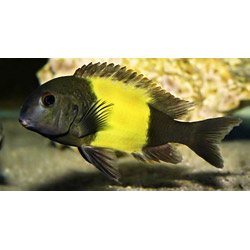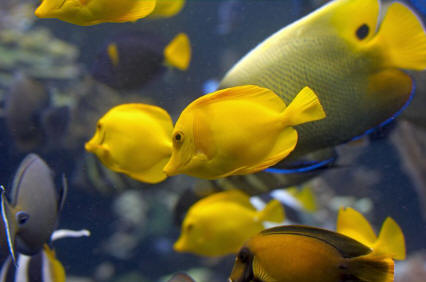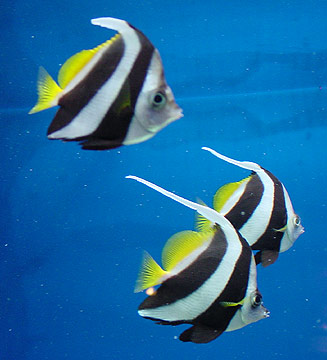Yellow Banded Tropheus Ikola

|
Scientific Name: Tropheus moorii Price: Upon Request Origin: Lake Tanganyika, Africa Family: Cichlidae NOT AVAILABLE NOW |
|
Other Names: Tropheus annectens, Moorii, Brabant Cichlid, Ikola, Tropheus ikola |
|
Technical Info
Temperature: 26 - 28 ℃
pH: 7.9 - 8.3
GH: 18 - 22
Max size: 10 cm
Min Tank size: 100 Ltr
Position in Aqua: No special swimming level
Description
The Tropheus ikola is a moderately deep bodied fish that seems to have a larger head in proportion to their body, a down turned mouth, and the body narrows as it forms the tail. The caudal fin is fan shaped. There are a number of geographic variations of the Tropheus ikola, each with a different color patterning depending on the locale from which they originate. Color morphs include fish with yellow stomachs, striped tails, rainbow markings, and cross-stripes along with bright yellows, reds, and blacks.
Food
The most important aspect of Tropheus care is feeding. In Lake Tanganyika, T. ikola feeds on algae, containing crustaceans and aquatic insects, much like mbunas of Lake Malawi. In captivity, it may graze on algae and should be fed a high-fiber diet. T. ikola can be fed on such live foods as Brine Shrimp, Mysis, other crustaceans, aquatic insects, and black mosquito larvae. Its diet must include
Breeding
Coaxing males into spawning in captivity is certainly not difficult and if provided with a large enough harem, the males can fertilize eggs every third day. When they want to spawn, they will act even more aggressive than normally. Courtship consists of the male diving in front of the female, shakings his body and shimmying until she decides that she wants to breed with him. He will then lead her to his claimed territory where the two fishes will assume the well-known “T-position”. After some circling and nudging, the female will release her eggs.Tropheus ikola is a maternal mouth-brooder and the female will pick up the eggs as soon as they have been released. She will then prod the male's went with her mouth until he fertilizes the eggs inside her mouth.
Compatible with
Julidochromis, Neolamprologus, Eretmodus, Synodontis, Lamprologus, Altolamprologus, Pseudotropheus.
Note
Tropheus ikola is an aggressive fish that is sensitive to life in captivity. The diet, water chemistry, tank set-up, and behavior all play important roles in keeping Tropheus. Perhaps the most difficult in the care of Tropheus is feeding the proper diet. Once this obstacle, and initial acclimation is overcome, Tropheus are tough fish.

